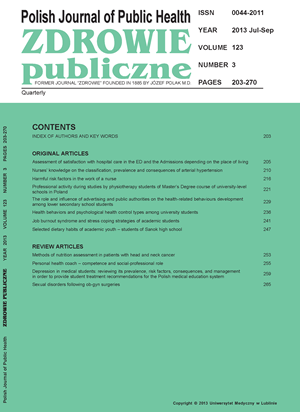Personal health coach – competence and social-professional role
DOI:
https://doi.org/10.12923/j.0044-2011/123-3/a.10Słowa kluczowe:
health coach, health training, health , health promotionAbstrakt
In conditions of civilizational hurry and, at the same time, specialisation and professionalization of almost ever sphere of life, the need of consultancy services is emerging. The aim of this work is to present a new social phenomenon of the increasing popularity of personal health coaches, who provide consultancy in the field of preventive medicine and health promotion.
The study shows the positive role of personal health coaches in social area and attempts to determine their competence in offered services e.g. organizing, planning and conducting individual health training. The fact of overly narrow understanding of the training of health and the concept of health coach, using only the resources in the area of physical culture, has been noted.
Bibliografia
1. Downie RS, Fyfe C, Tannahill A. Health promotion. Models and Values. New York: Oxford University Press; 1994.
2. Wojtczak A. Zdrowie publiczne wyzwaniem dla systemów zdrowia XXI wieku. Warszawa: PZWL; 2009.
3. Highlights on health in Poland 2005. WHO; 2006.
4. Wojtyniak B, Goryński P. Sytuacja zdrowotna ludności Polski. Warszawa: NIZP, PZH; 2008.
5. Narodowy Program Zdrowia 2007-20015 (2007), Załącznik do Uchwały nr 90/2007 Rady Ministrów z dnia 15 maja 2007r. Warszawa; 2007. p. 15.
6. Krawański A. Nauczyciele wychowania fizycznego w procesie społecznej edukacji prozdrowotnej. Wych Fiz i Zdrow. 1996;2:53-8.
7. Drabik J. Pedagogiczna kontrola pozytywnych mierników zdrowia fizycznego. Gdańsk: AWFiS; 2006.
8. Janicki G. Nowe aspekty czasu wolnego na przełomie wieków. In: Z. Dziubiński, K. W. Jankowski (ed). Kultura fizyczna w społeczeń-stwie nowoczesnym. Warszawa: AWF; 2009. p. 380-91.
9. Bułdak R, Sawczyn T. Zarządzanie zdrowiem. Wrocław: Szkoła Transfromacji; 2009.
10. Vickers A., Bavister S. Coaching. Gliwice: Wydawnictwo Helion; 2007.
11. Blanchard S, Homan M. Coaching. Poznaj tajniki sukcesu. Gliwice: Wydawnictwo Helion; 2007.
12. Symotiuk S. Stany ducha. Kraków: Instytut Wydawniczy “Maximum”; 2011.
13. Jacyno M. Kultura indywidualizmu. Warszawa; PWN; 2007. p. 10.
14. Nosko J. Zachowania zdrowotne i zdrowie publiczne. Łódź: Instytut Medycyny Pracy; 2005.
15. Heszen I, Sęk H. Psychologia zdrowia. Warszawa: PWN; 2007.
16. Syrek E. Zdrowie i wychowanie a jakość życia. Perspektywy i humanistyczne orientacje poznawcze. Katowice: Wydawnictwo Uniwersytetu Śląskiego; 2008.
17. Bator A, Kasperczyk T. Trening zdrowotny z elementami fizjoterapii. Kraków: AWF; 2000. p. 21.
18. Nowak PF. Rola treningu rekreacyjno-zdrowotnego na tle wzorców zachowań we współczesnej kulturze. In: S. Zagórny (ed). Wzory kultury somatycznej a styl życia. Opole: Politechnika Opolska; 2008. p. 59-70.
19. Ratamess, NA, Faigenbaum AD, Hoffman JR, Kang J. Self-Selected Resistance Training Intensity in Healthy Women: The Influence of a Personal Trainer. J Strength Cond Res. 2008;22(1):103-11. Review match


